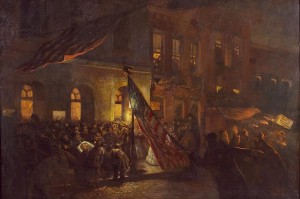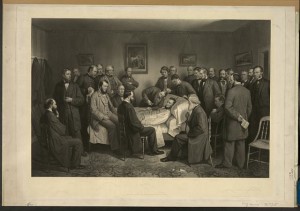
“Oil Painting of Mortally Wounded Abraham Lincoln Moved from Ford’s Theatre” (Photographs in the Carol M. Highsmith Archive, Library of Congress, Prints and Photographs Division.)
Our great leader is dead, but our “government of the people, by the people, for the people, shall not perish from the earth.”
From The New-York Times April 17, 1865:
The Effect of President Lincoln’s Death on National Affairs.
The death of President LINCOLN naturally excites universal and profound solicitude as to the immediate future of the country. He has been so marked a figure in the terrible events of the last four years, the action of the government in its contest with the rebellion has been so stamped by the impress of his personal character, and he had come to have so strong a hold upon the confidence and love of the whole people, without distinction of party, that his sudden removal from the stage of events naturally excites anxiety and apprehension in the public mind. He does, indeed, seem to have been needed to close the great work of pacification which he had so well begun.
Nevertheless, it is well to remember that the peculiar nature of our institutions makes it impossible that any one man should be absolutely indispensable to their preservation and successful working. Our government is of the people. They not only elect our rulers, but their spirit, their temper, their will pervade and control all the acts and all the measures of the government. Whoever dies, the people live, and the government lives also. If the Emperor NAPOLEON had been assassinated, all France would have been in revolution before twenty-four hours had passed away. President LINCOLN’s death, sudden and awful as it was — though it removes him in an instant from the most important and conspicuous position held by any living man, — does not interrupt for an instant the grand movement of our republican government. So far from exciting revolution, it only unites the whole people, more thoroughly than ever, in a common sentiment of devotion to the country and of profound grief for the great calamity that has fallen upon it. All party rancor is hushed. Political strife has ceased. All men of all parties, feeling a common interest and a common grief, stand together in support of the nation and of the man thus suddenly charged with the execution of the people’s will.
The current of events will continue to dictate the policy of the government, as it has done hitherto. The rebellion is already substantially crushed. The war, to all intents and purposes, is closed. There is nothing in the death of Mr. LINCOLN which can raise new armies for the rebel service or inspire new hopes for the rebel cause. No portion of the Southern people will be stimulated by it to renew the struggle. The same great Generals who have given our flag victory are still at the head of our armies and the act of an assassin has so fired the loyal heart of the nation, that those armies can be doubled in number if the necessity should arise. But it will not arise. The blow which has aroused the North will paralyze the South. The rebels will see in it nothing encouraging to their cause, nothing inciting them to new exertions on its behalf.
![Andrew Johnson taking the oath of office in the small parlor of the Kirkwood House [Hotel], Washington, [April 15, 1865] (Illus. in: Frank Leslie's illustrated newspaper, v. 21, 1866 Jan. 6, p. 245.)](https://www.bluegrayreview.com/wp-content/uploads/2015/04/3a12553r-300x237.jpg)
“Andrew Johnson taking the oath of office in the small parlor of the Kirkwood House [Hotel], Washington, [April 15, 1865” (Library of Congress)
In President JOHNSON, moreover, the country has a man of courage, of sound judgment and of a patriotism which has stood the test of the most terrible trials. His sympathies are with the people, and all his action will be for their good. He will respond to their sentiments and will execute their will. Nor will he be unmindful of the fact that the general line of policy which ABRAHAM LINCOLN was carrying out, when arrested by the murderer’s blow, commanded the hearty and universal approbation of the great mass of the American people. No man ever came suddenly to power with a plainer path before him than that which lies before the new President. And no one need fear for a moment that the rebellion is to gain anything by the death of President LINCOLN or by the accession to power of ANDREW JOHNSON as his successor.

